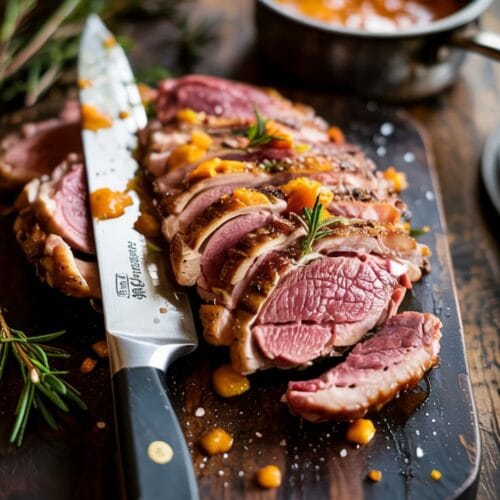
Orange-Glazed Duck Breast
This orange-glazed duck breast recipe creates the perfect balance of crispy skin and tender meat, complemented by a sweet-tangy citrus glaze. Elegant enough for special occasions yet simple enough for weeknight cooking—it's a restaurant-quality dish made easily at home.
Ingredients
- 2 duck breasts about 8 oz each, skin on (because skinless duck breast is a crime)
- Salt and freshly ground black pepper
- 1 tablespoon vegetable oil only if your duck isn't fatty enough
For the glaze
- 1 cup fresh orange juice from actual oranges, not that carton stuff if possible
- 2 tablespoons honey
- 2 tablespoons soy sauce
- 1 tablespoon orange zest
- 1 garlic clove minced
- 1 teaspoon fresh ginger grated
- 1 star anise pod optional, but makes you feel extra fancy
- 1 tablespoon butter the secret weapon of restaurant chefs everywhere
Instructions
- Take duck breasts out of the fridge 30 minutes before cooking. Cold duck straight into a hot pan is a recipe for tough, sad meat.
- Score the skin in a diamond pattern with a sharp knife, being careful not to cut into the meat. This helps the fat render and creates maximum crispiness. Think of it as giving your duck a fancy tattoo.
- Season both sides generously with salt and pepper. Don't be shy – duck can handle it.
- Place duck skin-side down in a cold (yes, cold) heavy skillet. Turn heat to medium and let it slowly heat up. This is the secret to rendering fat properly.
- Cook skin-side down for about 8-10 minutes until the skin is golden brown and crispy. Pour off excess fat as it accumulates. (Save that liquid gold for roasting potatoes later!)
- Flip the breasts and cook for another 4-5 minutes for medium-rare (internal temperature of 130-135°F).
- While the duck cooks, make the glaze. Combine orange juice, honey, soy sauce, orange zest, garlic, ginger, and star anise in a small saucepan.
- Bring the glaze to a boil, then reduce heat and simmer until it thickens to a syrupy consistency, about 10 minutes.
- Remove star anise and whisk in butter to make the sauce glossy and rich.
- Transfer cooked duck to a cutting board and let it rest under foil for 5 minutes. Don't skip this step unless you enjoy watching all those delicious juices run away from your plate.
- Slice duck breasts thinly against the grain and fan them out on plates. Drizzle generously with the orange glaze.
Notes
- Duck breast is best served medium-rare. If you cook it to well-done, it might as well be expensive leather.
- The rendered duck fat is liquid culinary gold. Save it for roasting potatoes or vegetables. Your taste buds will write you a thank-you note.
- Pat the duck skin completely dry before scoring to achieve maximum crispiness.
- You can make the orange glaze ahead of time and gently reheat when needed.
- Using a cold pan to start cooking the duck is counterintuitive but gives you that restaurant-quality crispy skin.